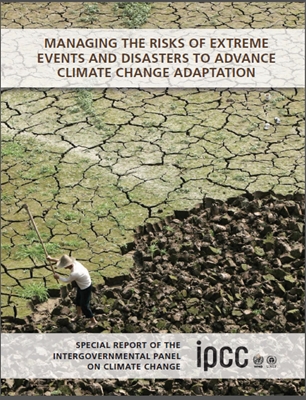
MANAGING THE RISKS OF EXTREME EVENTS AND DISASTERS TO ADVANCE CLIMATE CHANGE ADAPTATION
Extreme weather and climate events, interacting with exposed and vulnerable human and natural systems, can lead to disasters. This Special Report explores the challenge of understanding and managing the risks of climate extremes to advance climate change adaptation.
Weather- and climate-related disasters have social as well as physical dimensions. As a result, changes in the frequency and severity of the physical events affect disaster risk, but so do the spatially diverse and temporally dynamic patterns of exposure and vulnerability.
Some types of extreme weather and climate events have increased in frequency or magnitude, but populations and assets at risk have also increased, with consequences for disaster risk. Opportunities for managing risks of weather- and climate-related disasters exist or can be developed at any scale, local to international. Some strategies for effectively managing risks and adapting to climate change involve adjustments to current activities. Others require transformation or fundamental change.
The Intergovernmental Panel on Climate Change (IPCC) is the leading international body for the assessment of climate change, including the physical science of climate; impacts, adaptation, and vulnerability; and mitigation of climate change.
The IPCC was established by the United Nations Environment Programme (UNEP) and the World Meteorological Organization (WMO) to provide the world with a comprehensive assessment of the current state of knowledge of climate change and its potential environmental and socioeconomic impacts.
CAMBRIDGE UNIVERSITY PRESS
Cambridge, New York, Melbourne, Madrid, Cape Town,
Singapore, São Paulo, Delhi, Tokyo, Mexico City
Cambridge University Press
32 Avenue of the Americas, New York, NY 10013-2473, USA
www.cambridge.org
Information on this title: www.cambridge.org/9781107607804
© Intergovernmental Panel on Climate Change 2012
This publication is in copyright. Subject to statutory exception and to the provisions of relevant collective licensing agreements, no reproduction of any part may take place without the written permission of Cambridge University Press.
First published 2012
Printed in the United States of America
A catalog record for this publication is available from the British Library.
ISBN 978-1-107-02506-6 Hardback
ISBN 978-1-107-60780-4 Paperback


































